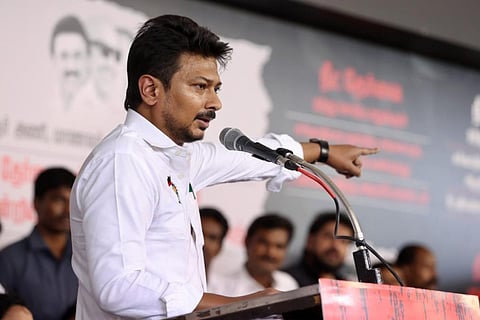

Tamil Nadu Minister for Youth Affairs and Sports Development Udhayanidhi Stalin has made a strong statement about the inauguration of the Ram Temple in Ayodhya. The consecration of the temple is being conducted as a grand affair on January 22. Prime Minister Narendra Modi will be presiding over the consecration ceremony.
Speaking to media in Ernakulam, Kerala, on Thursday, January 18 the minister said, “As Kalaignar [the late M Karunanidhi] said, we are not against any religion or belief. We don’t have a problem with a temple coming up there [Ayodhya]. We cannot agree with the demolition of the mosque that was already there in order to build the temple. As our treasurer [TR Baalu] said, do not mix religion and politics.”
The minister said this in response to a question from the press regarding the All India Anna Dravida Munnetra Kazhagam’s (AIADMK) general secretary’s stance regarding the inauguration of the Ram Temple. AIADMK general secretary Edappadi Palaniswami said that he would decide on taking part at the consecration of the Ram Mandir in Ayodhya depending on his health condition. He also said that the AIADMK is beyond caste and religion. “If I get a chance, I will participate in the consecration. Since I am suffering from leg pain, I will make a decision based on my health condition,” he had said.
Earlier on January 14, TR Baalu had said that the BJP was using the Ayodhya issue to garner votes in the upcoming general elections. The inaugural ceremony is set to take place five years after the Supreme Court’s verdict regarding the dispute in 2019.
Historically, the Babri Masjid, built by Mir Baqi, commander of Mughal emperor Babur in 1528, was demolished by kar sevaks belonging to Hindu majoritarian outfits on December 6, 1992. The demolition, which happened as a result of a concerted Ram Janmabhoomi movement, resulted in communal riots over months, which led to over 2,000 deaths. The Babri Masjid has been a contested site since 1885 as religious leaders and Hindutva outfits considered it Ram Janambhoomi or the birthplace of the Hindu deity Ram in Ayodhya.
A legal fight ensued in 1950 when Gopal Visharad Sharma approached Faizabad district court for the right to worship idols of Ram Lalla, which were placed there in 1949. On September 30, 2010, the High Court, in a 2:1 majority, ruled a three-way division of the disputed area between the Sunni Waqf Board, the Nirmohi Akhara and Ram Lalla.
Nine years later, in 2019, the Supreme Court granted the entire 2.77 acres of disputed land to deity Ram Lalla and directed the Uttar Pradesh government to allot five acres of land to Muslims for building a mosque. Though the Supreme Court referred to the mosque's demolition as "an egregious violation of the rule of law," the verdict was criticised for accepting the logic of “faith over fact” and granting legal possession of land to those responsible for the demolition.
Also read:
Politicisation of religion: Yechury on not attending Ayodhya temple inauguration
BJP's politics over Ram Mandir inauguration event dividing Hindus: Karnataka CM
‘Ayodhya Ram temple has divided, not united India’: Shankaracharya of Jyotish Peeth
Four prominent Shankaracharyas to skip inauguration of Ram temple: Here's why
How 1500 Dalits converting to Islam in a TN village set the stage for Ram Rath Yatra
Ram temple inauguration in Ayodhya: A look at the developments so far